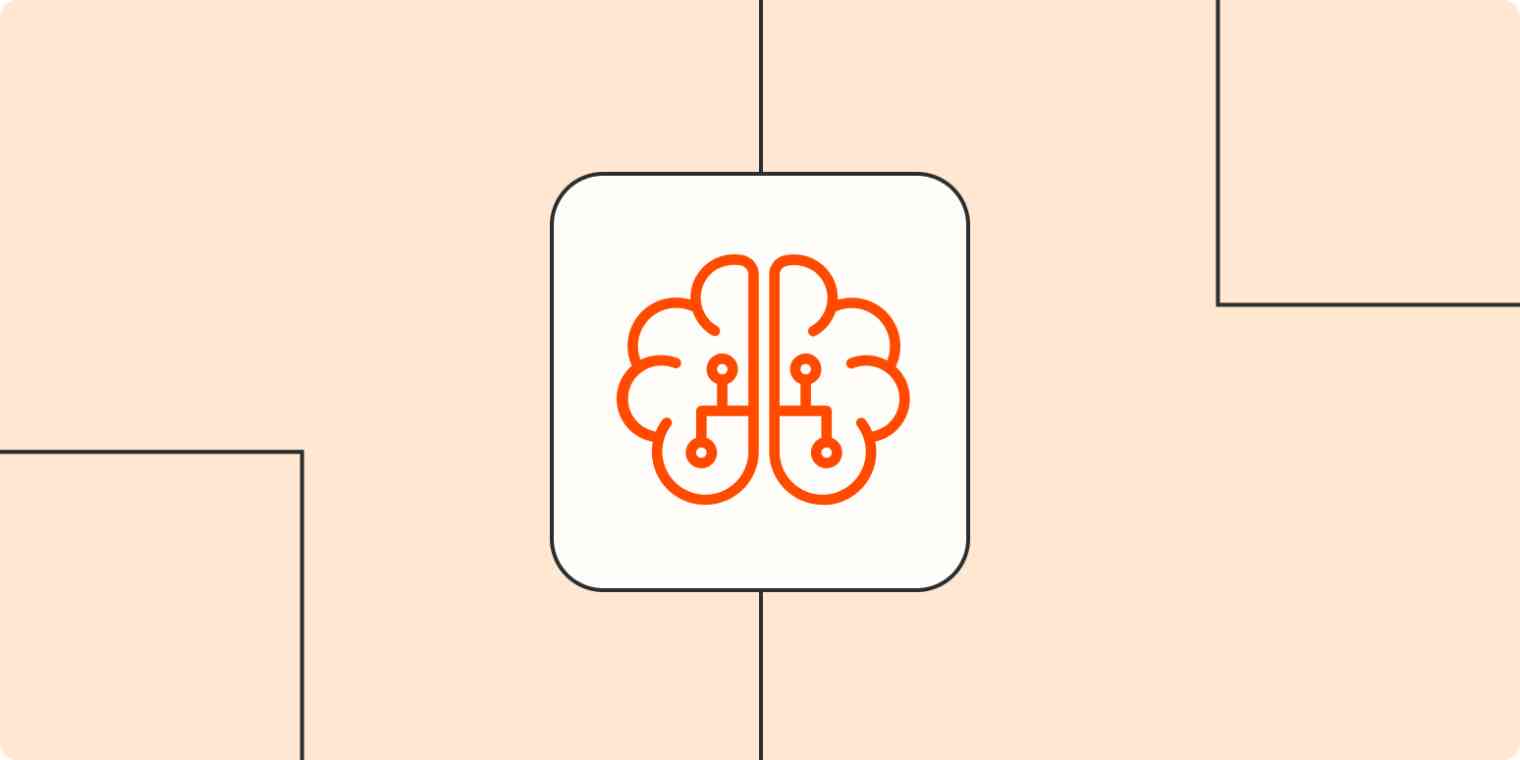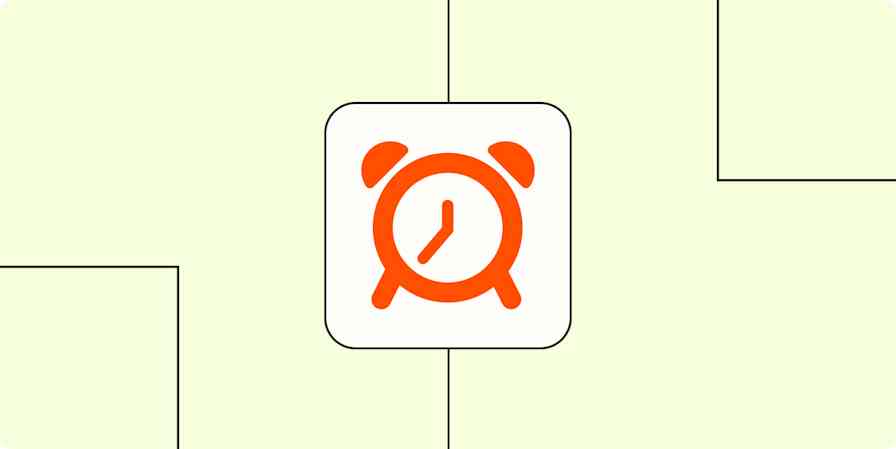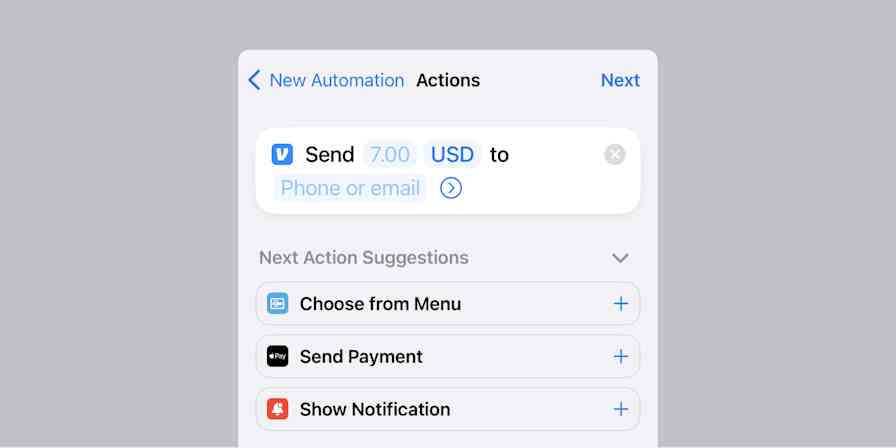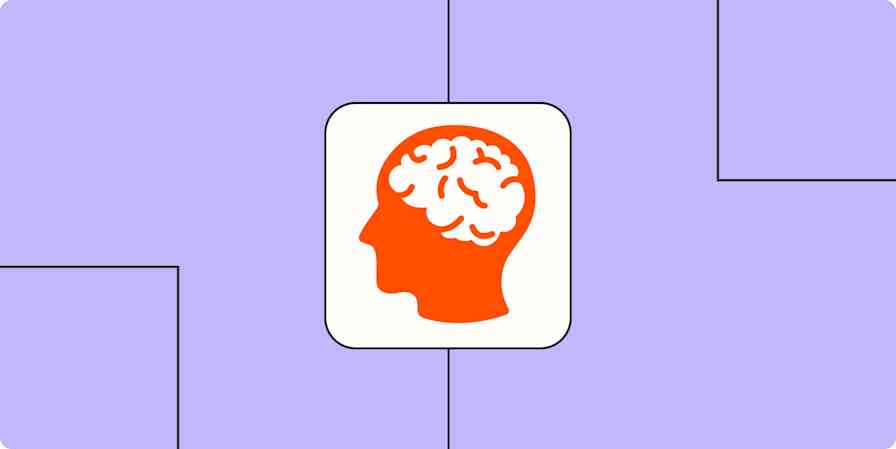My mental health dictates how I work.
I've lived with anxiety and situational depression for over 15 years. There's pretty much always a low hum of anxious thoughts going on in my brain. PTSD, another anxiety disorder, exacerbates things when I feel unsafe or overwhelmed, causing mood swings and panic attacks. I also average six to eight depressive episodes a year, which come with fatigue, brain fog, suicide ideation, and dissociation.
Seems like a recipe for disaster—especially since I run my own business—but after years of work (and therapy!), I've learned to appreciate how my mental health actually helps me work better.
1. It's taught me to be more self-aware
Anxious thoughts or PTSD triggers can easily lead to depression, so it's extremely important for me to monitor sudden changes in mood. A tactic I learned years ago at a birthparent retreat has become a lifesaver: gut checks. Gut checks are just like they sound—literally checking in with your gut to identify the source of stress.
I start by sitting down and getting quiet for a moment to identify what I'm feeling, whether it's panicky or nauseous, unfocused, upset or angry, or really tired. After a few minutes, I start asking myself broad questions, like "Is it work? Relationships? Lack of food or rest?" If I feel a gut clench or cramp in my stomach, I know I'm on the right track.
Based on the answer, gut checks can usually tell me:
That I need to take a break and do self-care. Snacks, drinking water or tea, taking a bath, and going on a walk are go-tos.
That I need to stop what I'm doing and problem-solve for a bit so my brain can calm down and focus on other things.
That I'm in for a mental health episode and need to rearrange my schedule and clock out fast.
The answers aren't always that clear, but even acknowledging my feelings is a great way to calm my anxiety, which then allows me to shift focus back to my work.
2. It's helped me learn when I work best
Everyone has an inner clock that ticks a little differently. It's called a circadian rhythm, and it helps regulate our bodies and minds as we wake up, eat, sleep, and work. Anxiety and depression like to play tricks, telling us to sleep all day or skip meals, which triggers more health issues and makes it difficult to maintain a good routine.
These mixed signals made me want to learn more about my body's natural baseline: what I need and when to work at my best.
One way to do this is by determining your chronotype, a fancy word for sleep type. I'm a "Bear" chronotype, which means I'm most awake and focused in the early-to-late morning and evening, with a post-lunch energy dip in the afternoon.
Knowing my chronotype helps me optimize my schedule, planning my workdays around time blocks that I'm most energized and least moody. It also helps knowing that I'm way more likely to be tired and unfocused if I take on projects or calls during my downtime.
3. It's made me more organized about scheduling
Stress isn't inherently bad—it's simply our reaction to what goes on in the world around us. The problem is that ongoing, unmanaged stress can take its toll and lead to mental health issues. For me, chronic mental health issues equal a low immunity to stress.
After a few rough periods of burnout and depression in 2020, I decided I needed to take a closer look at how I was working. Inspired by a good friend who colors her moods into a monthly bullet journal, I came up with a system for tracking my work hours, projects, and mental health, which you can see in the spreadsheet below.
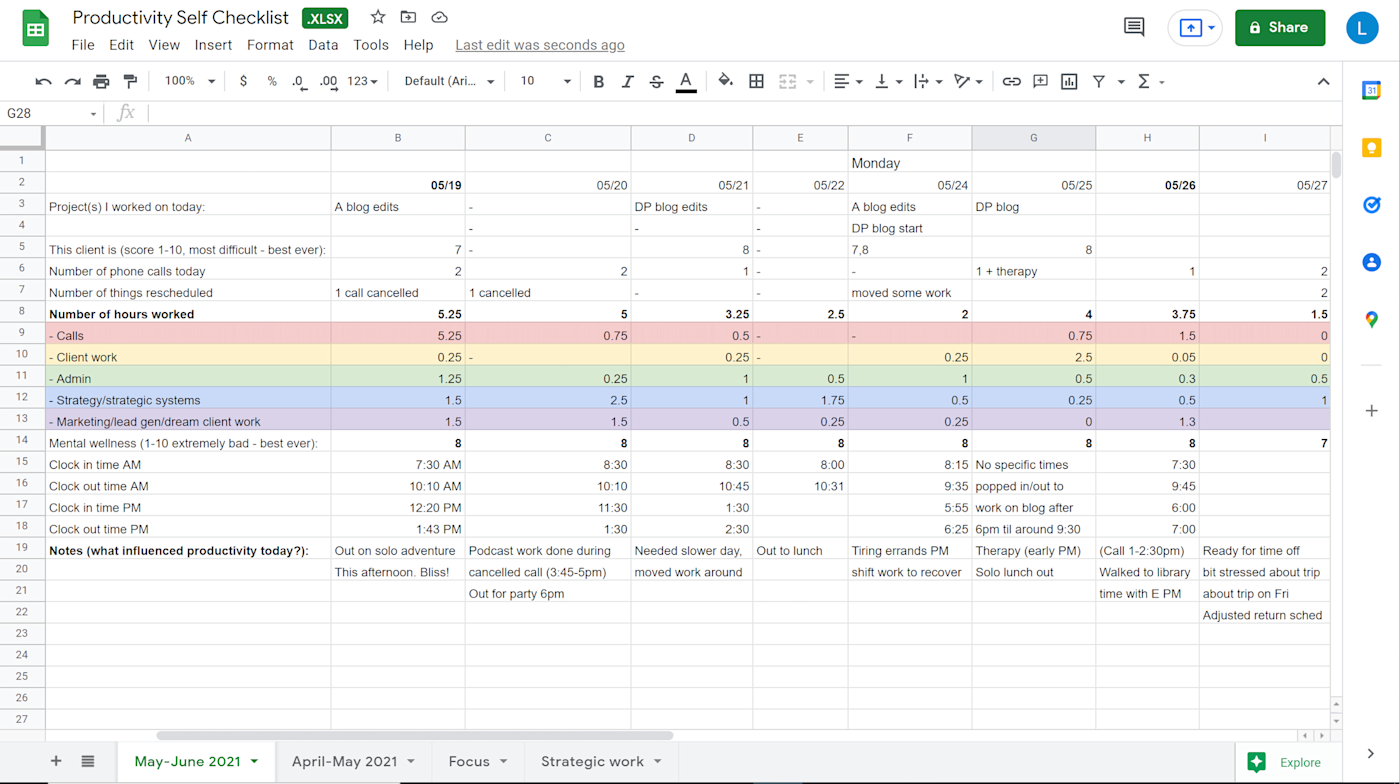
I did this for about two months and learned a whole lot in a short time, including:
Ideal time blocks for morning and evening work
Personal limits to the number of projects and client calls per day and week
Free-time activities that keep me happy and energized
Without those low points, I wouldn't have thought to look closer at my moods on workdays. But when your ability to function depends on mental health, you have to get creative with your systems. Tracking these different aspects of my life helped me gain valuable insights into how I can maximize my productivity and keep myself working well.
4. It's pushed me to embrace working differently
Mental health is rarely black and white. I have good and bad days, but most of the time, I live on a rollercoaster of extremes: energized and exhausted, happy and apathetic, panicky and numb.
On those rollercoaster days, being productive often means concentrating just long enough to power through my to-do list. When you live with uncertainty, it's important to have a flexible system that can help maintain a healthy balance. I call mine "intuitive scheduling," a form of gut check that helps me to decide how to plan my workday.
Instead of sticking to a schedule or trying to figure out what's wrong, I ask myself one simple question: "Are you ready to work?"
Sometimes, the question is all I need to clear my mind. Other times, my answer is to start a bit later or work on simpler tasks. And sometimes, I need my emergency protocol: short bursts of work broken up by long breaks until I've finished, no matter how late it is.
It's not always ideal, but it gets me through the day when I have work to do. And by listening to my body and honoring the need to work at my own pace, I can accomplish what I need to without compromising my health.
5. It's helped me set crucial boundaries
Spoon Theory creator Christine Miserandino describes her experience of living with a chronic medical condition as "having to consciously think about things when the rest of the world doesn't have to." As business owners, it's easy to get caught up in hustle culture and lose sight of things like wellness.
Mental health forces me to prioritize myself in my business, challenging me to figure out what I need to work at my best. I've learned the hard way that setting boundaries, and advocating for them, is one of the most important and healthy things I can do as a business owner.
Here're some of the boundaries I've set over time that have helped me work well:
Pre-screening clients, so they align with my business's values and communication needs
Sticking to project types and content within my niche, unless I'm making a strategic decision to branch out
Not answering emails or taking calls outside of designated work hours unless it helps me stay on track with mental health
Setting longer deadlines and competitive rates
6. It's encouraged me to invest in better business tools
There's nothing like having limited energy to motivate you to automate your business. I love getting creative about the tools and solutions that take things off my plate, so luckily, it's been a win-win. The trick is identifying gaps and finding the right solutions to fill them.
One of my favorite tools is a Zap—an automated workflow on Zapier—I set up when I noticed how often I was missing calls during bad mental health days. Now I get a text reminder 30 minutes before every event on my Google Calendar, which gives me time to refocus and prepare.

Zapier is a no-code automation tool that lets you connect your apps into automated workflows, so that every person and every business can move forward at growth speed. Learn more about how it works.
Some other investments I've recently made in my mental health and productivity:
Getting my finances in order with QuickBooks Small Business
Finally buying an annual Dubsado subscription to organize my clients and projects
Hiring a production assistant for my podcast
One last thing
Everyone's mental health looks different, and finding the right balance for yourself takes time. Is it easy? Honestly, no, it's not. Things still slip through the cracks, I still have so much to learn, and though my mental health has improved enormously, the difficulties are here to stay.
Caring for my wellness means constantly striving to do well, for my clients and for myself. I can now plan for the bad days and enjoy the good ones in a business that's built for me. And that makes all the difference.
